Kroger, America’s largest grocery store chain, will stop carrying products sourced by Asia Pulp & Paper (APP) due to concerns about deforestation, according to a statement on the company’s web site. The move comes after a Greenpeace campaign targeting Paseo, a fast-growing toilet paper brand owned by APP.
“After an independent review, The Kroger Co. and its family of stores have decided to discontinue the sourcing of products from Asia Pulp & Paper,” said a statement posted on the retailer’s web site. “Kroger has informed APP of our concerns about the impact of their business operations on deforestation.”
Kroger did not specify when it would stop carrying APP products.
Kroger is believed to be the largest seller of Paseo brand products. Greenpeace estimates that the company sold more than $15 million worth of APP tissue products in 2010 alone.
Kroger, which owns Cala Foods, Fred Meyer, Food 4 Less, Kroger Food and Drug, Quik Stop, Ralphs, Smith’s Food and Drug, and Tom Thumb Food Stores, among others, operates more than 3,600 stores in the United States.
APP has been targeted by environmental groups for its ongoing destruction of rainforests and peatlands in Indonesia. The paper and fiber supplier has missed three deadlines — 2004, 2007, and 2009 — for phasing out logging of natural forests.
Last week a coalition of Indonesian groups accused APP of destroying part of a sanctuary established for endangered Sumatran tigers. APP denied the charge, stating that the boundaries of sanctuary have changed.

Sumatran tiger in captivity
Related articles
New analysis supports claim that paper giant cleared part of its tiger sanctuary in Indonesia
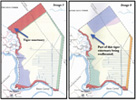
(12/21/2011) Asia Pulp & Paper (APP)’s supplier PT Ruas Utama Jaya has indeed cleared an area of forest it pledged to set aside as a tiger conservation reserve in Sumatra reports a legal analysis by Greenomics, an Indonesian environmental group. The Greenomics’ analysis supports allegations originally set forth in a report published last week by Eyes of the Forest, a coalition of green groups, and seems to refute a press release issued by APP that called the deforestation allegations ‘fiction’.
WWF: Asia Pulp & Paper misleads public about its role in destroying Indonesia’s rainforests
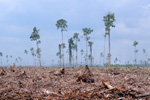
(12/16/2011) Asia Pulp & Paper (APP) continues to mislead the public about its role in destroying rainforests and critical tiger habitat across the Indonesian island of Sumatra, alleges a new report from Eyes on the Forest, a coalition of Indonesian environmental groups including WWF-Indonesia. The report, titled The truth behind APP’s Greenwash, is based on analysis of satellite imagery as well as public and private documentation of forest cleared by logging companies that supply APP, which is owned by the Indonesian conglomerate, Sinar Mas Group (SMG). The report concludes APP’s fiber suppliers have destroyed 2 million hectares of forest in Sumatra since 1984.
Report questions legitimacy of Asia Pulp & Paper’s conservation initiatives
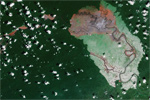
(11/22/2011) A new report by an Indonesian environmental group casts doubt on Asia Pulp & Paper’s commitment to sustainability. In its corporate social responsibility reports and advertisements, Asia Pulp & Paper (APP), one of Indonesia’s largest pulp and paper suppliers, has touted several forest reserves as indicators of its commitment to environmental stewardship. APP has portrayed these as voluntary, goodwill efforts to conserve Sumatra’s endangered wildlife. But in a new report, Greenomics-Indonesia, a Jakarta-based NGO, says that at best these projects represent compliance with existing Indonesian laws or are in areas where commercial exploitation isn’t viable.
War of words between Greenpeace, Asia Pulp & Paper over deforestation allegations
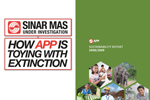
(11/16/2011) Greenpeace and Asia Pulp & Paper (APP), a giant global paper supplier, are locked in a heated battle over the activist group’s allegations that APP products contain fiber sourced from the destruction of forests in Indonesia. At stake is APP’s access to some of the world’s most lucrative markets. Until APP provides solid evidence refuting Greenpeace’s accusation that its pulp and paper production isn’t coming at the expense of natural forests in Indonesia, APP will have a difficult time winning over critics.
First ever survey shows Sumatran tiger hanging on as forests continue to vanish

(11/10/2011) The first-ever Sumatran-wide survey of the island’s top predator, the Sumatran tiger (Panthera tigris sumatrae), proves that the great cat is holding on even as forests continue to vanish. The study, carried out by eight NGOs and the Indonesian government, shows that the tiger is still present in 70 percent of the forests surveyed, providing hope for the long-term survival of the subspecies if remaining forests are protected.
Toymaker Hasbro cuts deforestation from its supply chain
(11/01/2011) Hasbro, the second largest American toy company, today announced a new packaging policy that excludes the use of fiber produced via destruction of rainforests, reports Greenpeace.
Paper suppliers risk damaging Indonesia’s reputation, argues report
(10/07/2011) Indonesia needs to re-evaluate forest areas and peatlands granted for pulp and paper plantations to reduce the risk of damaging the international reputation of its forest products and undermining its commitment to greenhouse gas emissions reductions, argues a new report published by an Indonesian activist group.
Toy giant Mattel drops paper from APP and other ‘controversial sources’

(10/05/2011) The world’s biggest toy-maker Mattel has pledged to overhaul its paper sourcing policies after a hard-hitting campaign from Greenpeace linked the toy giant to rainforest destruction in Indonesia by Asia Pulp and Paper (APP). Today, Mattel pledged to increase the use of recycled paper and sustainably-certified fiber to 70 percent by the year’s end, and 85 percent by 2015. In addition, the company has said any ‘controversial’ company engaged in natural forest destruction will be kept out of its supply line, referring to, but not naming directly, APP. Surprisingly, APP told mongabay.com that it ‘applauds’ Mattel’s new commitments.
Supermarket challenges toilet paper marker to disprove deforestation allegations
(08/31/2011) A major New Zealand supermarket chain has asked Cottonsoft to prove its environmental credentials after testing by WWF and Greenpeace revealed the toilet paper maker was using mixed tropical hardwoods sourced from Indonesia’s rainforests in its tissue. reports The Dominion Post.
APP affiliate ‘regrets’ astroturfing on Indonesia deforestation claims
(08/21/2011) Solaris, an Australian affiliate of Asia Pulp and Paper (APP), has been caught astroturfing an article that repeated criticism of APP from Greenpeace. The article, which appeared on Mumbrella—an Australian media and marketing news site—garnered a multitude of negative comments which were later tracked to IP addresses used by Solaris. Astroturfing is corporate or government messaging falsified as coming from the public or a grassroots movement.
Fuji Xerox Australia dumps paper supplier accused of rainforest destruction
(08/05/2011) Fuji Xerox Australia have severed ties with Asia Pacific Resources International (APRIL), an paper products giant accused of illegally clearing rainforests in Sumatra for pulp and paper production, reports Nine News.
Ironic conservation: APP touts tiger relocation after allegedly destroying tiger’s home
(08/02/2011) A female Sumatran tiger (Panthera tigris sumatrae) has been relocated from her threatened rainforest home to Sembilang National Park. According to Asia Pulp and Paper (APP) and the Sumatran Tiger Conservation Foundation (YPHS), the tiger had become an issue in its home region due to human and wildlife conflict. The group touted saving the tiger as ‘a significant moment for Sumatran tiger preservation’. However, Greenpeace says that the tiger would never have been a problem if APP were not destroying its habitat.

(07/27/2011) Indonesia’s forests were cleared at a rate of 1.5 million hectares per year between 2000 and 2009, reports a new satellite-based assessment by Forest Watch Indonesia (FWI), an NGO. Expansion of oil palm and wood-pulp plantations were the biggest drivers of deforestation, yet account for a declining share of the national economy. The study, which compared year 2000 data with 2009 Landsat images from NASA, found that Indonesia’s forest cover declined from 103.32 million hectares to 88.17 million hectares in ten years. Since 1950 Indonesia lost more than 46 percent of its forests.
Lego banishes Asia Pulp & Paper due to deforestation link

(07/07/2011) In response to a campaign by Greenpeace asserting that packaging used for its iconic toy building blocks is contributing to deforestation in Indonesia, the LEGO Group on Thursday announced it is taking steps to reduce the environmental impact of packaging materials and paper used in its products.
Barbie, Legos, other toys linked to destruction of Indonesia’s rainforests

(06/07/2011) Some of the world’s largest and most prominent toy-makers are sourcing their packaging materials from companies linked to large-scale destruction of Indonesia’s rainforests, alleges a new report from Greenpeace. The report, How APP is Toying with Extinction, is based on forensic analysis of toy packaging from Mattel, which manufacturers Barbie and Hot Wheels toys; Disney, which makes a variety of toys linked to its movies; Hasbro, which produces GI Joe, Star Wars, and Sesame Street toys and various games like Monopoly and Scrabble; and Lego, which makes the iconic plastic building blocks. The analysis found traces of mixed-tropical hardwood (MTH) and acacia fiber which are principally sourced from Asia Pulp & Paper (APP), an umbrella paper products brand that sources from several companies that have been linked to rainforest destruction in Sumatra.
Pulp and paper firms urged to save 1.2M ha of forest slated for clearing in Indonesia
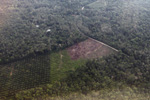
(03/17/2011) Indonesian environmental groups launched a urgent plea urging the country’s two largest pulp and paper companies not to clear 800,000 hectares of forest and peatland in their concessions in Sumatra. Eyes on the Forest, a coalition of Indonesian NGOs, released maps showing that Asia Pulp and Paper (APP) and Asia Pacific Resources International Limited (APRIL) control blocks of land representing 31 percent of the remaining forest in the province of Riau, one of Sumatra’s most forested provinces. Much of the forest lies on deep peat, which releases large of amount of carbon when drained and cleared for timber plantations.